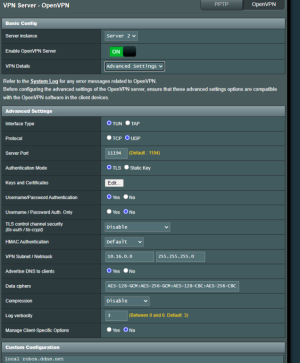I need to install a VPN server to access some of my devices remotely. I'm on an Xfinity 200/5Mbps contract, so quite slow specially for upload.
Given the relatively low end use, I'd like to use my existing hardware: either my RT-AC68U with Merlin, or one of my almost unused RPi 3B+ (1GB). Sooner or later I'll upgrade my main router to a better Asus model, but not for now. The router is only running Diversion and a few extra iptables rules, so it's very lightly loaded. The RPI3 is doing lightweight home automation, and even lower utilization. I will only need to connect while traveling, to check on a couple of thermo/humidity sensors, check a camera, etc. No heavy duty transfers
On the AC68U, OpenVPN seems to be the default choice, even if there now seems to be a way to run Wireguard. On the RPi3, plenty of choices.
I'd like to get input from this knowledgeable community on the best option both in terms of device to run the server on, and VPN to choose.
Given the relatively low end use, I'd like to use my existing hardware: either my RT-AC68U with Merlin, or one of my almost unused RPi 3B+ (1GB). Sooner or later I'll upgrade my main router to a better Asus model, but not for now. The router is only running Diversion and a few extra iptables rules, so it's very lightly loaded. The RPI3 is doing lightweight home automation, and even lower utilization. I will only need to connect while traveling, to check on a couple of thermo/humidity sensors, check a camera, etc. No heavy duty transfers
On the AC68U, OpenVPN seems to be the default choice, even if there now seems to be a way to run Wireguard. On the RPi3, plenty of choices.
I'd like to get input from this knowledgeable community on the best option both in terms of device to run the server on, and VPN to choose.
Last edited:


